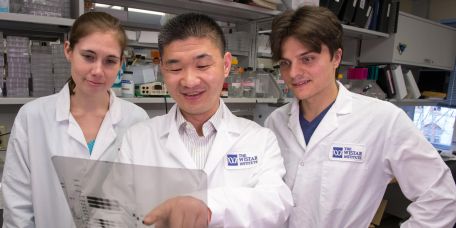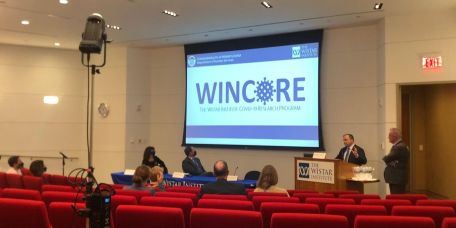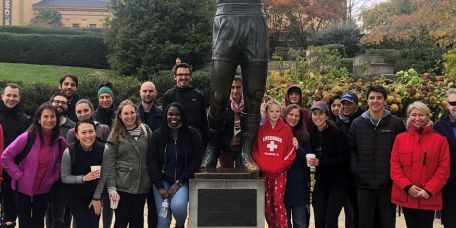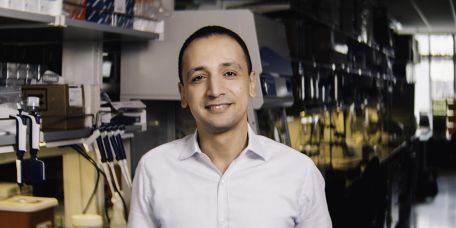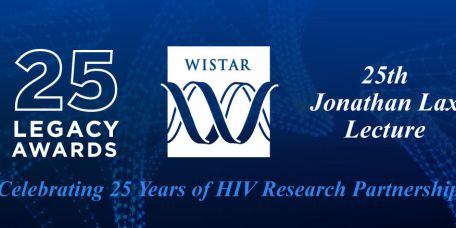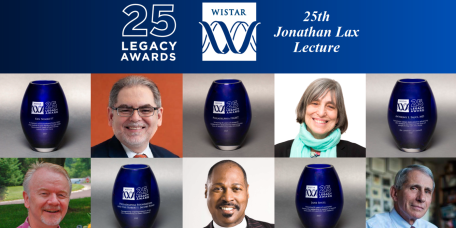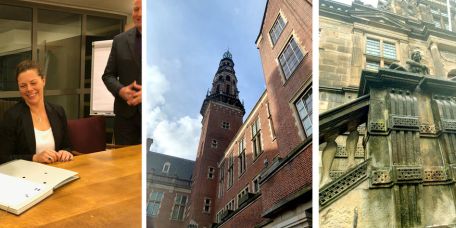The Wistar Institute
Wistar Scientists Identify Genes Critical to Protecting Ovarian Cancer from the Immune System
PHILADELPHIA — (Nov. 30, 2021) — Immunotherapies have shown striking clinical benefit in the treatment of many cancers, especially when used in combination with chemotherapy. However, some cancers respond poorly to immunotherapy, and ovarian cancer…
Wistar Study Identifies Two Genes That Protect Ovarian Cancer from the Immune System
Discovery could make immunotherapy more effective for ovarian and other cancers. Immunotherapy has shown significant benefits in treating many cancers, especially when combined with chemotherapy. But many cancers are resistant to immunotherapy. Ovar…
The Wistar Institute Receives $4 Million in Funding From the Commonwealth of Pennsylvania to Advance COVID-19 Research, Address COVID-19 Risk on Vulnerable Populations, and Assess Pandemic Preparedness
PHILADELPHIA — (Nov. 23, 2021) — The Commonwealth of Pennsylvania has granted The Wistar Institute $4 million to fund COVID-19 research focused on understanding the impact of COVID-19 on certain at-risk populations and supporting the commonwealth’s…
Wistar Scientists Discover Sugar Molecule on HIV-infected Cell That Plays a Role in Evading Immune System
All cells have an outer layer of sugar molecules – like the candy coating on an M&M. Now a new study by Wistar scientists shows how these sugars play a key role in helping HIV cells evade the immune system. The study also shows how this mechanis…
Wistar Champion Run for Research 2021
Our annual run has turned out to be special in more ways than one this year. We were able to rally together for the first time since the pandemic and feel the spirited comradery among our fellow colleagues that has been greatly missed. In addition…
Wistar Scientists Discover Sugar Molecule on HIV-infected Cell Plays Role in Evading Immune System — They Exploit as Weakness to Make More Effective “Natural Killers” Against HIV
PHILADELPHIA — (Nov. 11, 2021) — A new study by researchers at The Wistar Institute, an international biomedical research leader in cancer, immunology, infectious disease, and vaccine development, shows how key features on the surface of HIV-infecte…
Wistar Legacy Awards: Saluting Leaders in the Earliest Days of the AIDS Pandemic and Recognizing Their Lasting Legacy 25 Years Later
The Wistar Legacy Awards and 25th Jonathan Lax Lecture was a poignant night celebrating the people and organizations that 25 years ago came together from backgrounds in community activism, philanthropy, faith, government, law, and science to fight a…
Dr. Anthony Fauci and Philadelphia FIGHT’s Jane Shull Receive Wistar Legacy Award at 25th Anniversary of Jonathan Lax Memorial Lecture
PHILADELPHIA—(October 14, 2021)—The Wistar Institute is proud to announce Anthony S. Fauci, M.D., director of the National Institute of Allergy and Infectious Diseases, National Institutes of Health (NIH); Jane Shull, chief executive officer of Phil…
Powering Cancer Research
Wistar’s scientific accomplishments could not be achieved without the support of our donors who recognize our research strengths, share our vision and are committed to tackling disease, improving human health and answering the most pressing scientif…
Our Educational Partnership with Leiden University Medical Center
Throughout its history, Wistar has successfully cultivated strategic relationships to accelerate the development of its discoveries toward the clinic. Recognizing that the potential of scientific discovery in biomedical research extends well beyond…
